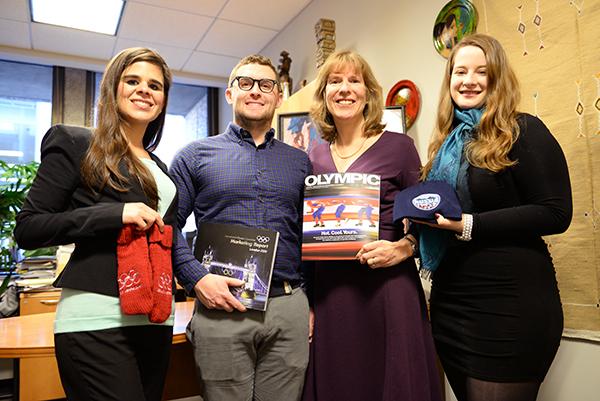
More than two dozen students will fly to the Winter Olympics next week, entering a country plagued by worldwide travel warnings.
Lisa Neirotti, associate professor of tourism and sport management who has planned a dozen student trips to the Olympic games, said her class has talked extensively about safety in Russia and has created an emergency plan in case of threats.
“I tell the students: ‘Be mindful of your surroundings, stay away from any type of protest and don’t antagonize any locals. We are guests in this country,’” said Neirotti, who received nearly 40 applications for the trip.
The U.S. State Department issued a travel alert last week advising Americans to be vigilant about security after Russian police found six bodies and abandoned cases of explosives near Sochi.
The Russian government has deployed more than 50,000 police and military personnel for the event. Border guards will scan all passengers and bags at train stations, and surveillance cameras will watch over public spaces. Organizers expect more than 80,000 spectators to attend the games each day.
Graduate student Amy Watson said while she acknowledges the dangers, the warnings won’t derail her excitement for the trip.
“None of us are naïve. It’s happening close to where we will be going and it’s always important to understand the situation, but we are prepared,” Watson said.
Megan Collins, also a graduate student, said she will be extra vigilant but knows that security is always a concern for events on the scale of the Olympics.
“It’s definitely a concern, but you can’t let an opportunity like this go by because of a ‘what if,’” said Collins, who has attended the Olympics three times so far.
During the 12-day-long trip, the 27 students will meet with athletes and Olympic officials, including 1984 gold medal hurdler Nawal El Moutawakel, the official consulting firm for Sochi 2014 and the producer of the opening ceremony.
Elana Meyers, an alumna and Olympic bobsledder, will also head to Sochi to compete after winning a bronze medal in the last Winter Olympics in Vancouver. The 29-year-old has degrees from the School of Public Health and Health Services and the GW School of Business.
The student group, which includes 24 graduate students and three undergraduates, will remain in the Olympic hub – with its tight security – for the majority of the trip, senior Trofym Anderson said.
He added that his only fear is traveling between the airport and the venue, particularly after the State Department warned travelers to be cautious of public transportation.
“I don’t plan to go venturing around Russia,” said Anderson, who also took the course when students traveled to London for the Summer Olympics. “I’m not too worried at all.”
Neirotti created GW’s three-credit class in 1992, helping students learn about the games holistically while also learning about details related to their specific field. Students will then write a paper on a subject of their choice that includes data and insight collected while at the games, such as how large events like the Olympics affect the local community.
The trip, which was created for tourism students in the business school, is also open to those studying hospitality or sports management in the business school, as well as international affairs students interested in Russian politics.
Todd Wegner, a graduate student working toward a master of business administration, said he wants to learn about the effects of the games on those involved from the start.
“This is a great opportunity to see firsthand the legacy of the event and how the Olympics will affect the people in the long run, being able to see both the good and the bad that can come from events like this,” Wegner said.
Though the trip’s costs vary by individual, most students will spend over $1,000 on airfare and about $100 a night on hotel rooms.







